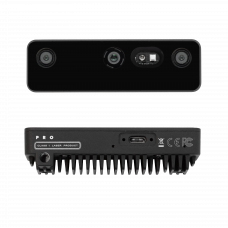OAK-D Pro Fixed Focus, OpenCV AI Machine Vision Kit, Depth Measuring, Image Recognition
Overview :
The OAK-D Pro is an upgraded version of OAK-D, featuring an IR laser dot projector (active stereo) and IR illumination LED (for night-vision). OAK-D Pro is from the Series 2 of OAK cameras. It’s smaller and lighter than the OAK-D.
Compared to the OAK-D S2, the only difference is the dot projector/illumination LED (Pro aspect of the version). Otherwise, the PCB and enclosure are the same.
Due to the large power consumption of dot projector/illumination LED, a Y-adapter is required when using these functions!
Looking for the Wide FOV OAK-D Pro? You can find it here.
Hardware specifications :
This OAK camera uses USB-C cable for communication and power. It supports both USB2 and USB3 (5Gbps / 10Gbps).
Sensor specifications:
For the normal FOV version you can select either FF or AF color camera, more information here.
|
Camera Specs |
Color camera |
Stereo pair |
|---|---|---|
|
Sensor |
||
|
Shutter |
rolling |
global |
|
FOV (D/H/V) |
81°/69°/55° |
89.5°/80°/55° |
|
Resolution |
12MP (4032x3040) |
1MP (1280x800) |
|
Focus |
FF: 50cm - ∞ |
FF: 19.6cm - ∞ |
|
Max Framerate |
60 FPS |
120 FPS |
|
Pixel size |
1.55µm x 1.55µm |
3µm x 3µm |
|
Lens size |
1/2.3 inch |
1/4 inch |
How it works :
This OAK model doesn’t have an IR filter on mono cameras (the production version will have notch IR filters at 940nm), which allows only visible light and IR light from illumination LED/laser dot projector to the camera.
Laser dot projector projects many small dots in front of the device, which helps with disparity matching, especially for low-visual-interest surfaces (blank surfaces with little to no texture), such as a wall or floor. The technique that we use is called ASV - conventional Active Stereo Vision - as stereo matching is performed on the device the same way as on OAK-D (passive stereo).
Note :
Laser dot projector and flood LED are disabled by default! That’s because most people would prefer intentionally enabling the laser dot projector when they are wearing eye safety gear.
On the image below there’s a blank wall with no texture. Without the dot projector, (passive) depth perception is poor. With the dot projector set to ~200mA, the (active) depth perception looks much better. If you look closely at the bottom left frame, you can see little dots all around the wall.

Flood IR LED illumination allows perceiving low-light and no-light environments. You can run your AI/CV processes on frames that are illuminated by the IR LED. Note that the color camera doesn’t perceive IR light, so you would need to use a mono camera stream for your AI/CV processes.
 Getting started :
Getting started :
To get started with this OAK model, you first need to install depthai library version 2.15 or above. You can set IR laser dot projector and illumination LED via the API as below.
with dai.Device(pipeline) as device: device.setIrLaserDotProjectorBrightness(100) # in mA, 0..1200 device.setIrFloodLightBrightness(0) # in mA, 0..1500
You can set these two parameters in DepthAI Demo in the Depth tab:
 Projector specifications
Projector specifications
|
Projector Specs |
Value |
|---|---|
|
Dot projector |
Ams Belago1.1 Dot-Pattern Infrared Illuminator |
|
Number of dots |
4700 |
|
HFOI* 50% |
78 ± 7% |
|
VFOI* 50% |
61° ± 7% |
|
VSCEL wavelength |
940nm |
|
Operating temperature |
10°C to ~60°C |
|
Temperature absolute limits |
0°C to ~80°C |
|
|
FOI = Field of illumination. Also note that in datasheet, HFOI and VFOI are switched, that’s because we mount the Belago1.1 rotated as we want greater horizontal field, to match field of cameras.
RVC2 inside :
This OAK device is built on top of the RVC2. Main features:
4 TOPS of processing power (1.4 TOPS for AI)
Run any AI model, even custom architectured/built ones - models need to be converted.
Encoding: H.264, H.265, MJPEG - 4K/30FPS, 1080P/60FPS
Computer vision: warp/dewarp, resize, crop via ImageManip node, edge detection, feature tracking. You can also run custom CV functions
Stereo depth perception with filtering, post-processing, RGB-depth alignment, and high configurability
Object tracking: 2D and 3D tracking with ObjectTracker node
Dimensions and Weight :
Weight: 91g

Depth perception :
This OAK camera has a baseline of 7.5cm - the distance between left and right stereo camera. Minimal and maximal depth perception depends on camera FOV, resolution, and baseline - more information here.
-
Min perceivable distance: ~20cm (400P, extended), ~35cm (400P OR 800P, extended), ~70cm (800P)
-
Max perceivable distance: ~35 meters
Extended means that StereoDepth node has Extended disparity mode enabled, more information here. Maximum perceivable distance calculation here.
Laser safety :
This product is classified as a Class 1 Laser Product under the EN/IEC 60825-1, Edition 3 (2014) internationally.
-
Do not power on the product if any external damage was observed.
-
Do not attempt to open any portion of this laser product.
-
Invisible laser radiation when opened. Avoid direct exposure to the beam.
-
There are no user serviceable parts with this laser product.
-
Modification or service of the stereo module, specifically the infrared projector, may cause the emissions to exceed Class 1.
-
No magnifying optical elements, such as eye loupes and magnifiers, are allowed.
-
Do not try to update camera firmware that is not officially released for specific camera module and revision.

Links Related to OAK-D Pro Fixed Focus : Datasheet
Enter the code in the box below:






